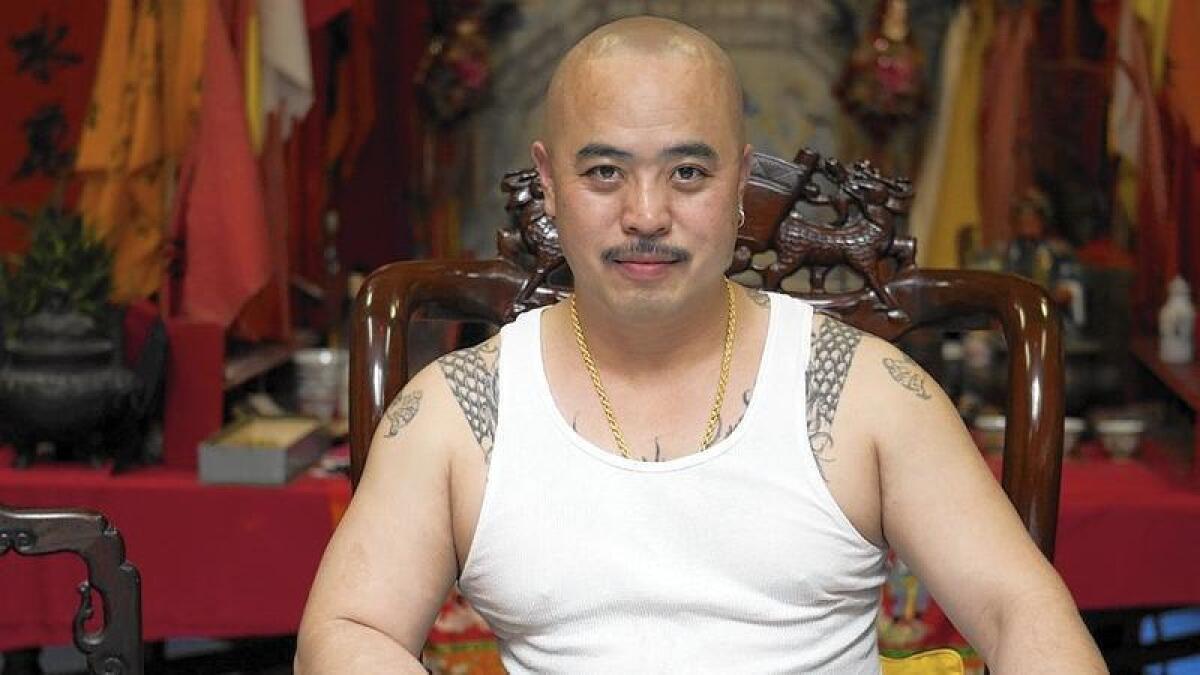‘Shrimp Boy’ gets life in prison for murder, corruption in San Francisco case

- Share via
Raymond “Shrimp Boy” Chow — the so-called dragonhead of a San Francisco Chinatown fraternal organization — was sentenced Thursday to life in prison for murder and other charges stemming from a massive corruption case that cost millions in taxpayer dollars and infiltrated the city’s political establishment.
U.S. District Court Judge Charles Breyer also ordered Chow, 56, to pay $15,881 to the victim’s family to pay for funeral and other related expenses, said Abraham Simmons, a spokesman for the U.S. attorney’s office in San Francisco.
A federal jury in January found Chow guilty on 162 counts — including racketeering, robbery, aiding and abetting the laundering of drug money and conspiring to deal in the illegal sales of goods. Prosecutors sought a life term “because Chow has dedicated his entire life to organized criminal activity, violent crime and using others for his own power and personal enrichment.”
In a sentencing memorandum, they said that “Chow has refused at every opportunity to accept any responsibility or express any remorse for his actions,” while portraying himself as a community activist dedicated to helping Chinatown’s youth.
“Most [criminals] are true to their nature: violent gangsters, but openly so,” prosecutors said. “Chow was a wolf in sheep’s clothing for years — not even true to himself.”
The investigation that led to Chow’s arrest and prosecution swept up numerous others, including Democratic state Sen. Leland Yee.
In February, Yee was sentenced to five years in prison for doing political favors in exchange for campaign cash.
Chow was found guilty of arranging the 2006 slaying of Allen Leung, who preceded him as head of the Chinatown fraternal organization Ghee Kung Tong.
Leung was gunned down by a masked assassin at his import-export business. While talking to an undercover agent later, Chow admitted his involvement in Leung’s slaying, saying “that he wanted money from Mr. Leung and that he would tell Mr. Leung once or Mr. Leung would be gone,” according to court documents.
“Of course, the man who directly benefited from that murder was defendant Chow,” prosecutors said.
According to court documents, Chow ran a criminal enterprise in San Francisco’s Chinatown for decades and “roped” young kids into his organization, ruining their lives. He had “supreme authority” in an international organized crime group known as the Triad, authorities said.
Chow knew exactly what he should not have been doing with youngsters and he did it anyway, in a profound contrast to his public persona.
— Prosecutors
“Chow knew exactly what he should not have been doing with youngsters and he did it anyway, in a profound contrast to his public persona,” prosecutors said.
Chow’s attorney submitted dozens of letters from young people, expressing their support for him. Many were written by students who had sat through one of Chow’s classroom presentations or workshops about gang life.
“When Raymond Chow came to our class in the fall of 2006, I was skeptical about meeting him,” one student wrote. “I had never met a man like him and I was nervous. However, once he began to speak about his life, I could see in his eyes a man that had made some bad mistakes but was hoping to come back from them.”
In Chow’s sentencing memorandum, his attorney argued that his client had a serious heart condition and suffered from asthma and arthritis, requiring constant medical care. He also cited Chow’s “exceptional good works” and contributions to the community, as well as his impoverished upbringing in China and the U.S.
“By all accounts Raymond Chow has pledged to live a humble life, characterized by public service and community outreach,” J. Tony Serra wrote. “He experienced a true epiphany after prison and thereafter devoted his life to bona fide social causes.”
Born in Hong Kong in 1960, Chow came to the United States at 16. His grandmother gave him the nickname “Shrimp Boy” because of his small stature, according to documents and law enforcement sources.
In 1978, he was convicted of armed robbery and spent more than seven years in prison. Then in 1986, after being indicted on charges including assault with a deadly weapon, mayhem and possession of a firearm. he served three years in prison.
According to records, Chow forged an alliance with Triad member Peter Chong. Along with a third man, they created Tien Hu Wui — the Whole Earth Assn. — to oversee organized crime in San Francisco, according to federal court documents.
In 1995, Chow faced a judge again and this time he was convicted on a variety of federal firearms and prostitution-related charges. He was sentenced to 280 months in prison.
“Chow’s history and characteristics are deplorable,” prosecutors in the murder and racketeering case said. “The government doubts that the court, with all of its years of experience, has had occasion to sentence a defendant with a more violent and depraved past.”
For breaking news in California, follow VeronicaRochaLA on Twitter.
ALSO
Until his arrest, ‘Shrimp Boy’ considered an ‘inspiration’
Federal judge is fed up with verbose lawyers and their bloated briefs
After ‘very embarassing’ blunders, prosecutors offer no-jail deal in L.A. Coliseum corruption case
UPDATES:
3:05 p.m.: This article was updated with additional details about Raymond Chow’s sentence.
This article was originally published at 3:05 p.m.
More to Read
Sign up for Essential California
The most important California stories and recommendations in your inbox every morning.
You may occasionally receive promotional content from the Los Angeles Times.










